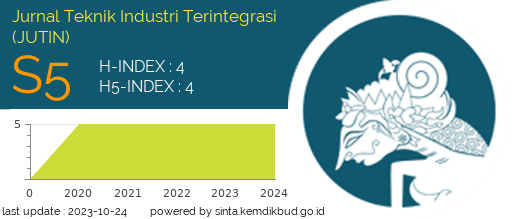The Role of Supply Chain Finance in Humanitarian Aid Relief : Literature Review
DOI:
https://doi.org/10.31004/jutin.v7i1.25452Keywords:
Humanitarian aid, Supply chain, Logistics, Finance, FundingAbstract
Humanitarian aid relief has been operational since the late 19th century, addressing development and disaster aid cases. The intricate relationship between humanitarian aid relief and the supply chain encompasses various stages, from securing funding to coordinating stakeholders. However, the volatile and uncertain nature of the field poses challenges such as corruption, prolonged funding gaps, and demands for accountability and visibility. This study highlights the critical role of funding and financing in the humanitarian supply chain, emphasizing the underdeveloped state of research on supply chain finance (SCF). The paper aims to investigate the integration of SCF into humanitarian aid relief, utilizing literature reviews from journals, papers, and reports.The findings reveal a correlation between SCF's essential elements—focused on liquidity/cash, operational activities, and engagement among actors. This research proposes a framework, how the humanitarian aid relief sequence and SCF theory should collaborate for effective humanitarian aid supply chain finance (HASCF) practicesReferences
Bals, C. (2019). Toward a supply chain finance (SCF) ecosystem – Proposing a framework and agenda for future research. Journal of Purchasing and Supply Management, 25(2), 105–117. https://doi.org/10.1016/j.pursup.2018.07.005
Caniato, F., Gelsomino, L. M., Perego, A., & Ronchi, S. (2016). Does finance solve the supply chain financing problem? Supply Chain Management, 21(5), 534–549. https://doi.org/10.1108/SCM-11-2015-0436
Day, J. M., Melnyk, S. A., Larson, P. D., Davis, E. W., & Whybark, D. C. (2012). Humanitarian and disaster relief supply chains: A matter of life and death. Journal of Supply Chain Management, 48(2), 21–36. https://doi.org/10.1111/j.1745-493X.2012.03267.x
Gatignon, A., Van Wassenhove, L. N., & Charles, A. (2010). The Yogyakarta earthquake: Humanitarian relief through IFRC’s decentralized supply chain. International Journal of Production Economics, 126(1), 102–110. https://doi.org/10.1016/j.ijpe.2010.01.003
Heaslip, G., Kovács, G., & Haavisto, I. (2018). Cash-based response in relief: the impact for humanitarian logistics. Journal of Humanitarian Logistics and Supply Chain Management, 8(1), 87–106. https://doi.org/10.1108/JHLSCM-08-2017-0043
Hofmann, E. (2005). Logistik Management. Logistik Management, May. https://doi.org/10.1007/978-3-322-82165-2
Keele S. (2007). Guidelines for performing systematic literature reviews in software engineering. Technical Report, Ver. 2.3 EBSE Technical Report. EBSE, January 2007.
Miko, N. U., & Abbas, U. (2023). Determinants of efficient last-mile delivery: evidence from health facilities and Kaduna Health Supplies Management Agency. Journal of Humanitarian Logistics and Supply Chain Management, 1, 4–16. https://doi.org/10.1108/JHLSCM-05-2022-0054
Okoli, C. (2015). A guide to conducting a standalone systematic literature review. Communications of the Association for Information Systems, 37(1), 879–910. https://doi.org/10.17705/1cais.03743
Oloruntoba, R., & Gray, R. (2006). Humanitarian aid: An agile supply chain? Supply Chain Management, 11(2), 115–120. https://doi.org/10.1108/13598540610652492
Schultz, J., & Søreide, T. (2008). Corruption in emergency procurement. Disasters, 32(4), 516–536. https://doi.org/10.1111/j.1467-7717.2008.01053.x
Tranfield, D., Denyer, D., & Smart, P. (2003). Towards a Methodology for Developing Evidence-Informed Management Knowledge by Means of Systematic Review. British Journal of Management, 14(3), 207–222. https://doi.org/10.1111/1467-8551.00375
Veron, P. (2022). Digitalisation in humanitarian aid: opportunities and challenges in forgotten crises. 143. https://reliefweb.int/sites/reliefweb.int/files/resources/Digitalisation-humanitarian-aid-ECDPM-Briefing-note-143-2022.pdf
Downloads
Published
How to Cite
Issue
Section
License
Copyright (c) 2024 Yasmin Mauliddina, Puji Handayani Kasih

This work is licensed under a Creative Commons Attribution-ShareAlike 4.0 International License.





